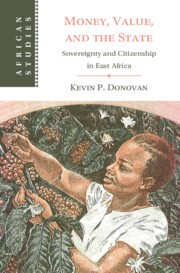Book contents
- Money, Value, and the State
- African Studies Series
- Money, Value, and the State
- Copyright page
- Dedication
- Contents
- Figures
- Acknowledgments
- A Note on the Text
- Introduction
- 1 The Moneychanger State
- 2 A Monopoly on Valuation
- 3 Restricted Value
- 4 Crimes against Economy
- 5 Magendo
- Conclusion
- Archival Collections Consulted
- Bibliography
- Index
- African Studies Series
2 - A Monopoly on Valuation
Economic Sovereignty and Citizenship in Uganda
Published online by Cambridge University Press: 05 December 2024
- Money, Value, and the State
- African Studies Series
- Money, Value, and the State
- Copyright page
- Dedication
- Contents
- Figures
- Acknowledgments
- A Note on the Text
- Introduction
- 1 The Moneychanger State
- 2 A Monopoly on Valuation
- 3 Restricted Value
- 4 Crimes against Economy
- 5 Magendo
- Conclusion
- Archival Collections Consulted
- Bibliography
- Index
- African Studies Series
Summary
Beginning in the late colonial period, banking and money became a central interface between the state and its subjects, with Ugandans demanding greater access to credit. In the years after independence, the government responded to expectations of commercial liberty by using savings and loans to turn colonial subjects into credible citizens—dutiful producers of export value whose personal “banking habit” would serve the nation as a whole. Whether through the Bank of Uganda’s national currency or the Uganda Commercial Bank’s vans circling the countryside, economic citizenship tried to sidestep the nation’s lack of affective solidarities by weaving together monetary ties. For many, this was welcome, but simultaneously, these financial interdependencies limited exchange across territorial borders. As a result, some people—among them, Asians, migrants, and residents of the border regions—were cast as suspicious subverters of the nation-state. Rather than a question of merely inclusion or exclusion, this chapter shows that postcolonial citizenship worked through “enforced membership,” as national currency imposed inclusion within the state’s monopoly on valuation, sometimes with violent implications (as in the case of the 1972 expulsion of Ugandan Asians).
Keywords
- Type
- Chapter
- Information
- Money, Value, and the StateSovereignty and Citizenship in East Africa, pp. 92 - 147Publisher: Cambridge University PressPrint publication year: 2024

